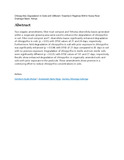Please use this identifier to cite or link to this item:
http://ir-library.mmust.ac.ke:8080/xmlui/handle/123456789/1578Full metadata record
| DC Field | Value | Language |
|---|---|---|
| dc.contributor.author | Mutua, Gershom Kyalo | - |
| dc.contributor.author | Ngigi, Anastasiah Njoki | - |
| dc.contributor.author | Getenga, Zachary Moranga | - |
| dc.date.accessioned | 2021-06-03T14:03:27Z | - |
| dc.date.available | 2021-06-03T14:03:27Z | - |
| dc.date.issued | 2015-03-24 | - |
| dc.identifier.uri | https://doi.org/10.1007/S00128-015-1465-0 | - |
| dc.identifier.uri | https://pubmed.ncbi.nlm.nih.gov/25617186/ | - |
| dc.identifier.uri | http://r-library.mmust.ac.ke/123456789/1578 | - |
| dc.description.abstract | Two organic amendments, filter mud compost and Tithonia diversifolia leaves generated within a sugarcane growing area were used to enhance the degradation of chlorpyrifos in soil. Filter mud compost and T. diversifolia leaves significantly enhanced degradation of chlorpyrifos in soils (p < 0.05) with DT50 values of 21 and 24 days, respectively. Furthermore, field degradation of chlorpyrifos in soil with prior exposure to chlorpyrifos was significantly enhanced (p = 0.034) with DT50 of 21 days compared to 30 days in soil with no previous exposure. Degradation of chlorpyrifos in sterile and non-sterile soils were significantly different (p = 0.023) with DT50 values of 161 and 27 days, respectively. Results show enhanced degradation of chlorpyrifos in organically amended soils and soils with prior exposure to the pesticide. These amendments show promise in a continuing effort to reduce chlorpyrifos concentrations in soils. | en_US |
| dc.language.iso | en | en_US |
| dc.publisher | Bulletin of Environmental Contamination and Toxicology | en_US |
| dc.subject | Chlorpyrifos,Degradation, Soils, Treatment, Regimes, | en_US |
| dc.title | Chlorpyrifos Degradation in Soils with Different Treatment Regimes Within Nzoia River Drainage Basin, Kenya | en_US |
| dc.type | Article | en_US |
| Appears in Collections: | Gold Collection | |
Files in This Item:
| File | Description | Size | Format | |
|---|---|---|---|---|
| Chlorpyrifos Degradation in Soils with Different Treatment Regimes Within Nzoia River Drainage Basin.pdf | 294.51 kB | Adobe PDF |  View/Open |
Items in DSpace are protected by copyright, with all rights reserved, unless otherwise indicated.
